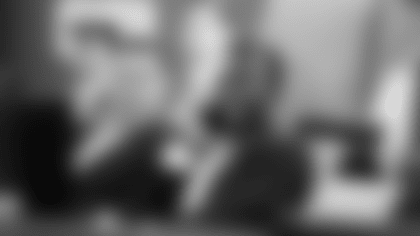By: Lindsey Young
Coming out of the 2015 season, Mike Harris had all the optimism in the world.
He'd started all 16 regular-season games – and one playoff game – at right guard for the Vikings. He'd been in the NFL four seasons and spent two in Minnesota after playing for the Chargers from 2012-13.
"I had all the potential," Mike recalled of the season that felt like a potential turning point in his career.
As things turned out, it was a turning point. Just not in the way Harris expected.

Harris went through the 2016 offseason and started Organized Team Activities in May, just like he'd always done. But everything changed one day when Harris suffered an arteriovenous malformation (AVM) rupture after returning home from practice.
In layman's terms, Harris was born with an abnormal connection between arteries and veins in his brain but hadn't been aware of the condition. The rupture that day caused bleeding into the brain, which caused immediate symptoms.
"It first felt like a bomb went off in my head. Then I experienced double vision, headaches, dizziness and pain," Harris said. "I lost the use of my motor skills and was very sensitive to light. My fear and anxiety were through the roof."
Initially, it was unclear what medical event Harris he'd experienced. Were these pronounced concussion symptoms? Something even more serious?
He was referred to Mayo Clinic, where he underwent an angiogram and a CT scan to confirm the diagnosis. Doctors told him he'd be sidelined during the 2016 season; whether he'd able to return in 2017 remained in question.

"It was definitely a hard time in my life. I just remember times of feeling isolated, more than anything," Harris said. "Not being around my teammates and coaches, or the facility. I remember locking myself away in my apartment, not wanting anyone to know about my condition. The fear of looking weak or people saying, 'Oh, what's wrong with Mike?'
"I was definitely in a place where I'd lost my identity," he added. "I just didn't know what was going to happen next."
Football was Harris' livelihood. His passion. The way others often defined him, and the way he saw himself.
When he found that rug ripped out from under him, Harris struggled to stand strong.
Harris fell into a depressive state, battling a dark mental space and suicidal thoughts.
"It was really just about uncertainty," he reiterated. "The uncertainty was killing me. And not [talking] to anybody about it was hard, as well."
Harris underwent brain surgery and additional scans in 2017 before receiving crushing news: he was, almost certainly, done playing football forever.
"I always had that hope I'd be able to come back eventually. It wasn't until that final scan where it was like, 'Yeah, you need to move on because this is going to be a huge health risk for you,' " Harris recalled. "At the end of the day, I was 30 years old; I had a lot of life to live. Family counted on me. I was with my girlfriend Melissa, who was counting on me.
"That was just a hard decision to make," he continued. "But if there was a health scare or the risk of it happening again, that was one thing I had to avoid. I was lucky the first time; a second time, I wouldn't have been as lucky."
A native of Los Angeles, California, Harris struggled with living nearly 2,000 miles from family – especially his mom – during such a difficult time.

But if there's one thing about parents, it's that they often find ways to support from afar. Harris' mom regularly communicated with him and worked to find a therapist in Eden Prairie, Minnesota, that her son could speak with.
Harris met twice a week with the therapist, learning to navigate a myriad of feelings and working through the "darkness that had grown in my heart."
"I was just mad at everybody. I didn't want to have anything to do with football. I was just trying to escape and be in isolation," he said. "I didn't want to be bothered by anyone because, in my head, I was just so ashamed of what happened to me. I mean, something so small – the size of a millimeter – is preventing me from playing again. I was in a dark place for a couple of years.
"I was lost. You talk to any former athlete – when it's all said and done and you have no more fans, you have no more teammates, it's like, 'Then what?' " Harris continued. "There were a lot of nights of me thinking, 'What is my future going to look like? How am I going to make money? … How am I going to bring value to this world again?' I was looking at myself and not liking what I saw.

Harris credits many things for helping him climb out of the "pit" he felt himself in: prayer, the support of his mom and of Melissa, whom he married on Aug. 8, 2020. He's continued talking to a therapist and connected with Vikings Team Clinician Dr. Brownell Mack.
He's also gotten involved with coaching.
The new career journey started in 2018, when Harris' former Vikings teammate Brandon Fusco connected him with a close friend, Zach Makray, who coached basketball at Hopkins.
"One day Zach was like, 'Hey, do you want to coach? It's a volunteer job, but it'll allow you to get out of the house and be around these kids and be a good mentor.' I was like, 'Yeah, why not?' " Harris said.
Nearly immediately, he felt refreshed just being around a team atmosphere again. Having an impact on young men, particularly those in athletics, motivated Harris in a way he hadn't been for quite some time.
One thing led to another. The Hopkins football coach at the time, John DenHartog, invited Harris to coach the team's offensive line, and he most recently has been coaching at Macalester College in St. Paul.

"A lot of doors opened just by me putting myself out there – forgetting my insecurities, my shyness – but just being myself, being someone that these kids could look up to," Harris said. "It's grown into a career that I'm proud of and am continuing to climb."
Coaching and mentoring young men, Harris said, has given him a new purpose in life.
"By me just being there and sharing my story … They all know the 'ups' of me playing in the league and living out my dream, but the downs, as well, I'm able to share and help them battle whatever they're going through," he explained. "Mental health's definitely a big deal with this generation, and I'm glad – I'm privileged – to be able to work with them and help mold these young men into people that will go off into the world and do great things."
Though life has certainly thrown Harris multiple curveballs, he's thankful for so much. At one point, he couldn't imagine a time he wouldn't be playing football. Now, he can't imagine life without Melissa, whom he calls his biggest cheerleader.

"Not just her, but her family – they've really welcomed me in with loving arms. Every family event, activity, she makes sure I'm there," Mike said. "We fell in love. Literally, from the first day. She wasn't with me when I was playing. She was with me when I was going through all the trips to Mayo Clinic and the angiograms and surgery."
Mike and Melissa live locally with their three dogs, Winston, Luna and Sophie.
"We really have a place of peace," he said. "A place I was just able to take time to recover these past few years and feel good. Feel confident in who I am today."
Mike is proud of how far he's come from those dark days following the AVM rupture – but also acknowledges the importance of tending to one's mental health consistently. For he and Melissa, that often means trips to LifeTime Fitness Edina, where she works as a yoga instructor, or giving back in various ways.
"I could lie to you and say I don't still deal with those traumas, those insecurities. But what I do to work on that is, I get moving," Mike said. "We've built a community there at LifeTime. I've found people there who are just really like-minded, friendly and loving. I can go there and be myself, get my breath work in, get my stretching in. It's been a game-changer for me.
"Also, my work in the community has been amazing. Just seeing the type of kids and youth we have in our inner city that need to see men that look like me – and to see that I'm there, I've got their back, and they can learn from my story," he continued.

Mike plans to continue coaching football and impacting the lives of young athletes, as well.
"It's honestly given me a purpose again. My goal is to make it to the top, but where I'm at right now, what I'm doing, is pretty remarkable," he said. "It's amazing to wake up every morning with a purpose and have a place to be, have tasks to do, and a community that I'm proud to be a part of."
What prompted Mike to share more of his story now?
He believes it's important to get open and be vulnerable about difficult experiences. After all, it might help someone else facing similar circumstances.
"We all have pain that's holding us down. That prison in your mind that's telling you stuff that's not true," Mike said. "For this younger generation, hearing from a man like me who's 6-5, 330 pounds, that's dealt with trauma, that's dealt with a lot of upsets and ups and downs – that's battled through it and gained some resiliency – [is impactful].
"I want people to know my story," he emphasized. "I want them to know that I made success out of failure, and I've been able to climb out of that pit I was in, and if I can do it, so can you."






